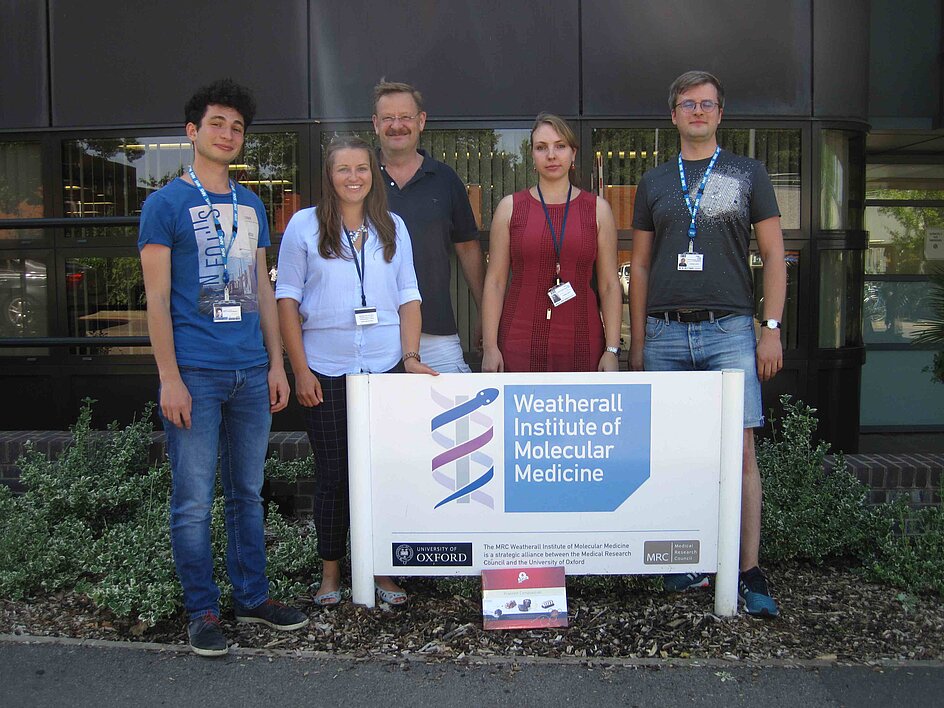Research fellowships of usually 9 to 12 months, but if appropriate also shorter, are competitively awarded and fund selected undergraduate and graduate students in the form of a tax-free 1,500 Euro per month scholarship. Students are chosen based upon their academic potential, prior research experience, social and language skills in personal interviews, unless funding is provided in the context of an already existing, productive collaboration. If selected, the students propose research groups of particular interest to them. Application to potential host laboratories is then either directly, or with support from the HAL-OX programme organizer. Interested host laboratories conduct interviews via skype or directly on-site.
The duration of the financial support enables HAL-OX research fellows to pursue their own defined research questions, rather than just accompanying an ongoing project. Student research progress is monitored through either written reports or oral presentations and host laboratory feedback. We are pleased to report that the experience on both sides of the research network has so far been exclusively positive.
Additional travel grants of 1,000 Euro per month are available for academic staff employed at Martin-Luther-University Halle-Wittenberg to cover additional living and travel expenses. Justified higher costs may also be reimbursed.
Research Fellows

Project title: How sequence variation in the non-coding genome can lead to disease
Funding period: 01.10.2024 - 31.03.2025
The HAL-OX program enabled me to spend six months in the Hughes Group (Genome Biology) at the Weatherall Institute for Molecular Medicine. During this time, I learned a lot about molecular methods, bioinformatic analysis and gene regulation in health and disease. It was particularly exciting for me to see how experimentally generated data and machine learning approaches work together to better understand the non-coding genome, three-dimensional chromatin structure and regulatory processes at the genome level. I was impressed by the motivation and creativity of the team, which colored my everyday life on site. I received an incredible amount of support and felt like a full member of the group right from the start. This experience was also very impactful for me personally - especially because of the people I got to know there and the diversity of cultures, knowledge and perspectives that each individual brought with them.
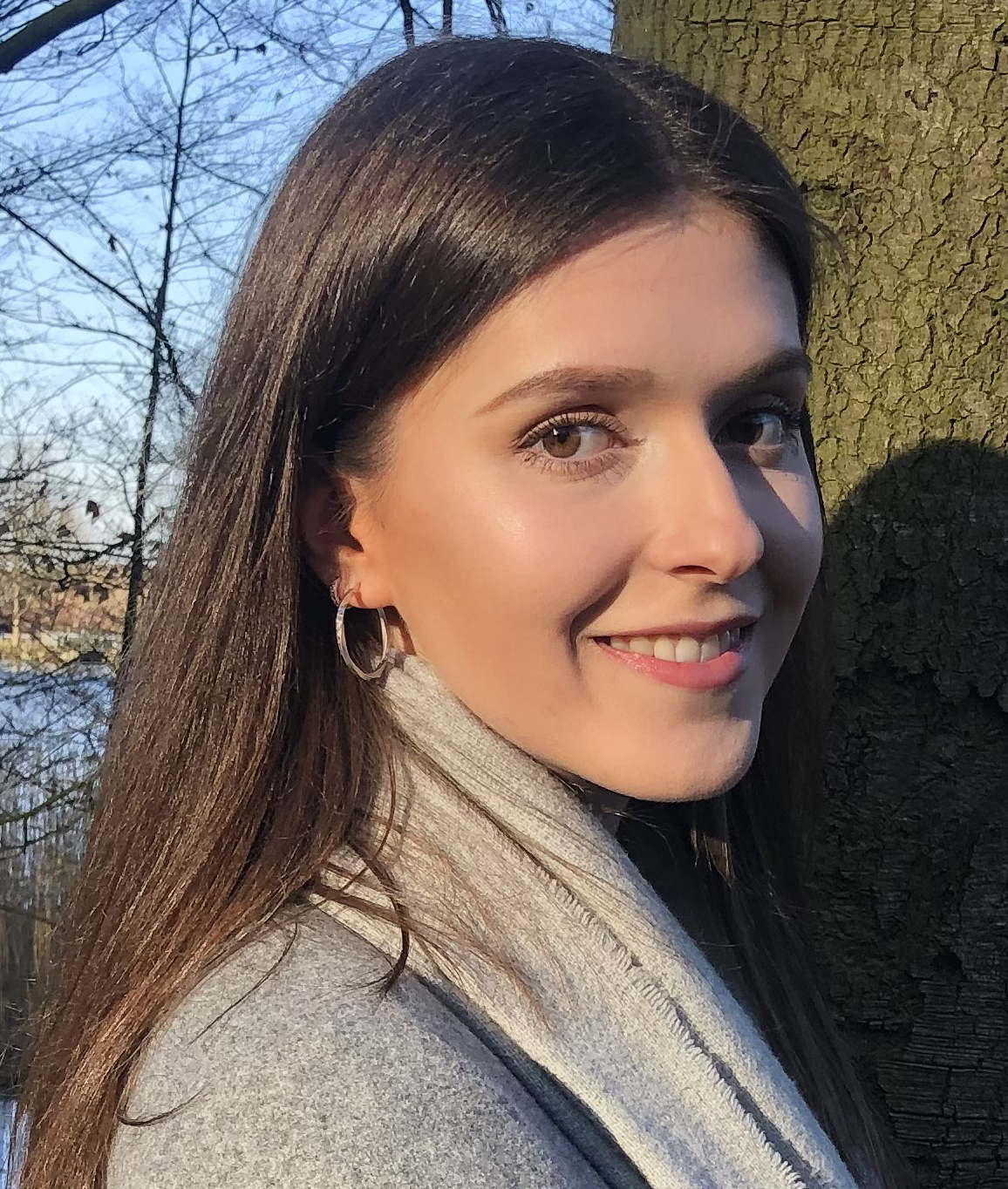
Project title: Analysis of Stem Cell Environment
Funding period: 01.07.2022 - 31.12.2022
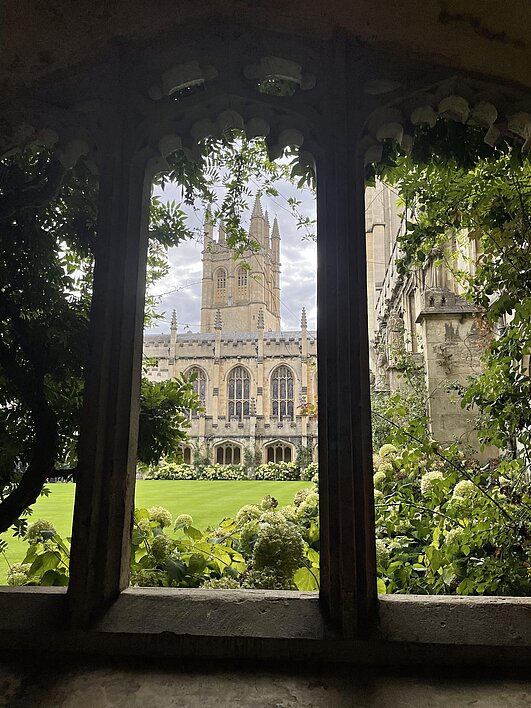
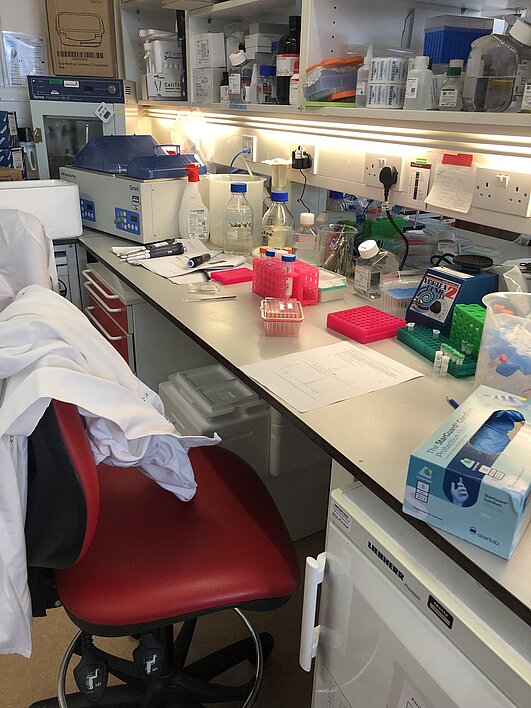
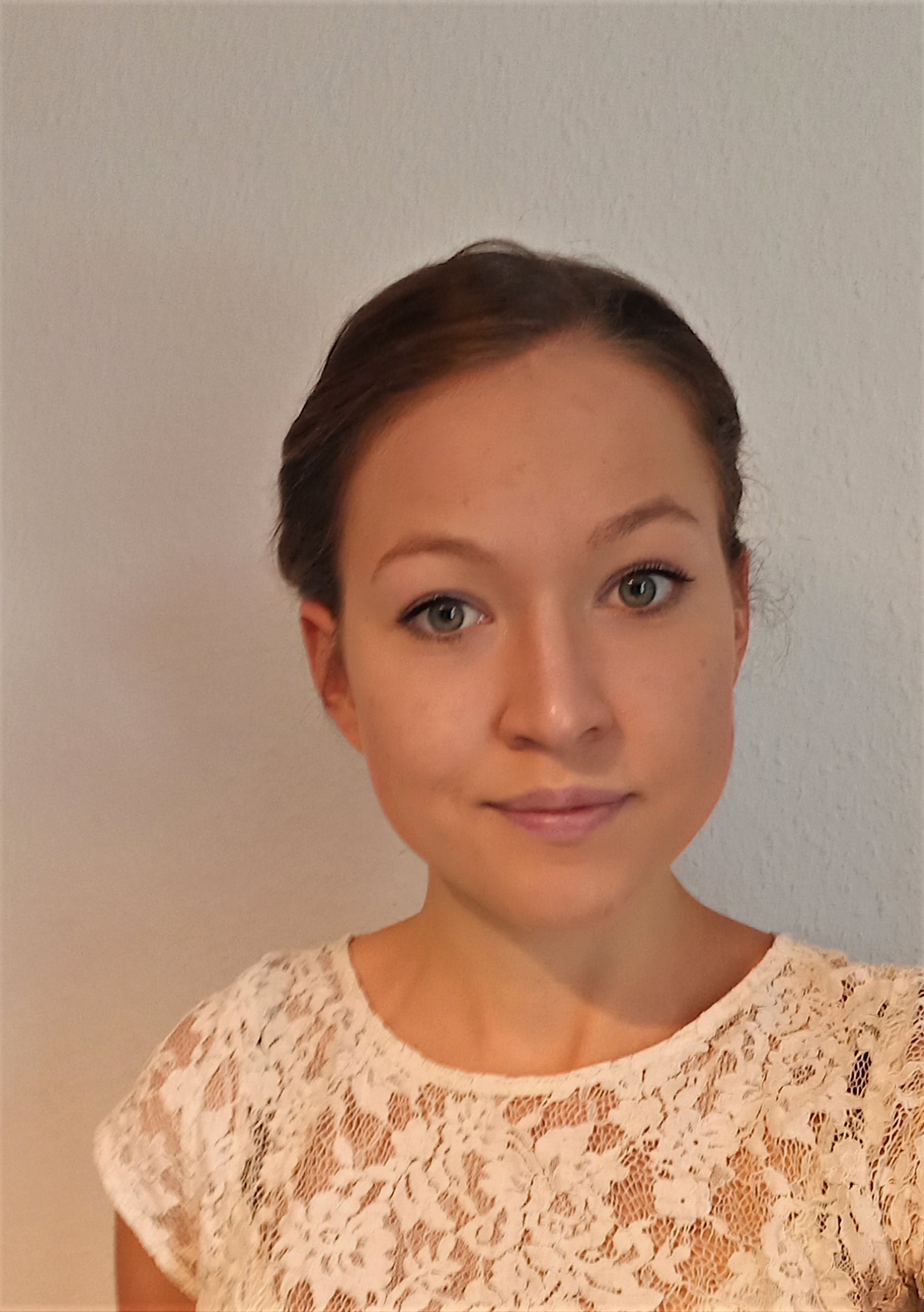
Project title: Molecular Characterisation of a Human Fetal Liver Derived Infant Leukaemia Model
Funding period: 01.09.2021 - 31.03.2022
The HAL-OX program enabled me to do research in the group of Prof. Anidita Roy and Prof. Irene Roberts at the MRC Weatherall Institute of Molecular Medicine. Despite initial uncertainty due to the pandemic situation, it was possible to work on my project in Oxford. Thus I was able to gain new skills in both experimental lab work and bioinformatic analysis due to the great support of the team. The working atmosphere at WIMM was very inspiring, cross-group exchange and support were important components of scientific work. In addition to weekly "floor talks" and "occasional seminar," also social evenings and events were organized. I am very grateful for the formative time I had in Oxford thanks to Prof. Feller and the HAL-OX program.
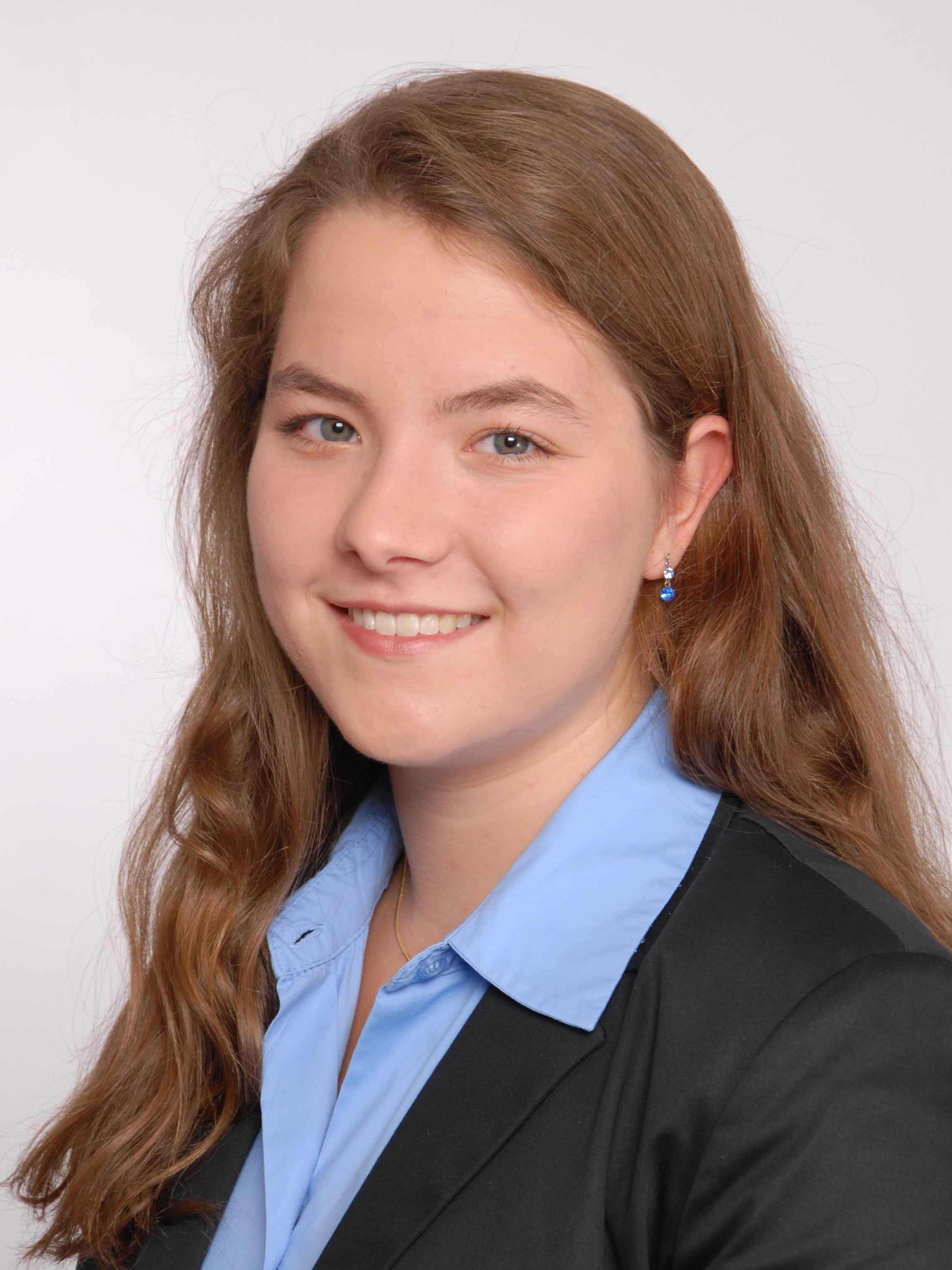
Cooperation: Dr. Heidi Olzscha, Medizinische Fakultät der Martin-Luther-Universität Halle-Wittenberg, Institut für Physiologische Chemie, Proteinopathien (Research objectives: Posttranslational modifications (PTMs)) and Professor Kim Midwood, University of Oxford, Kennedy Institute of Rheumatology, Midwood Group - Matrix Immunology
Project title: Characterisation of an integrin binding site within the FBG domaine of tenascin-C
Funding period: 01.04.2020 - 30.09.2020
"As part of the HAL-OX programme I was allowed to cooperate for my medical doctoral thesis with the Matrix Immunology Group established by Professor Kim Midwood at the Kennedy Institute, Oxford. Unfortunately, the six-month stay in Oxford could not be carried out as planned due to the Covid19 pandemic, but I was allowed to continue my experiments in the group of Heidi Olzscha at the Institute of Physiological Chemistry. Thanks to modern techniques and great flexibility of all those involved, a close and successful cooperation was nevertheless possible. I learned a lot during that time, both about matrix immunology in general and various biochemical methods. For this, and for the extraordinary experiences in two great groups, I am very grateful and proud to have been part of the HAL-OX programme."
Project title: Prostate cancer in sub-Saharan Africa: trends in incidence and survival
Funding period: 15.01.2020 - 31.08.2020
After finishing my medical studies, the HAL-OX program made my research stay at the Nuffield Department of Population Health possible. The atmosphere of scientific and also social vision, progressivity and innovation prevailing in Oxford impressed me a lot. I can only recommend to participate in the HAL-OX program and want to thank Prof. Feller for this opportunity of professional and personal development.
During my stay I especially appreciated the regular talks at the institute, featuring prestigious researchers.
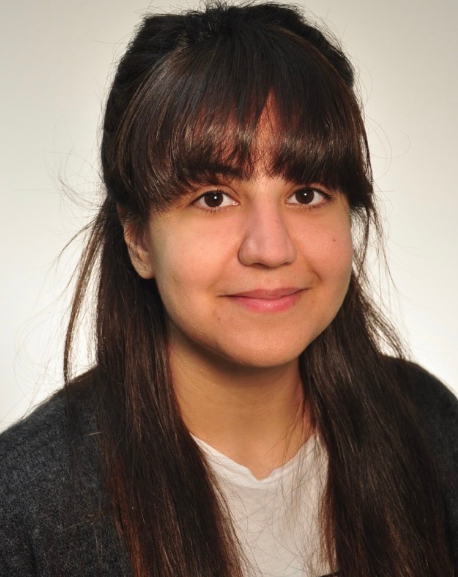
Project title: mRNA Dysregulation
Funding period: 06.12.2019 - 31.05.2020

Project title: Identification and characterisation of the chromatin-binding profile of different MLL fusion proteins
Funding period: 14.10.2019 - 31.03.2021
"After my 6th semester of studying medicine in Halle I went to Oxford to work on my MD. Up to that point I had no research experience and, at 21, was quite a bit younger than most PhD students in the UK. Nevertheless, I was welcomed with open arms and immediately considered and treated as part of the team, which was both challenging and incredibly motivating. Despite pandemic circumstances, I have learned an enormous amount about epigenetics and leukaemia, but also about Oxford and the UK, and about everyday life in science and research. I am truly grateful and proud to have been part of the HAL-OX programme."
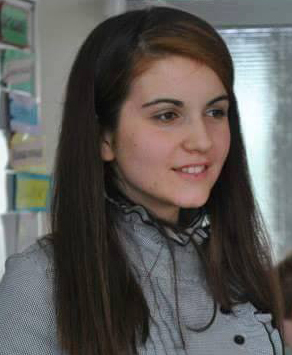
Guest laboratory: Dr. Heidi Olzscha, Medizinische Fakultät der Martin-Luther-Universität Halle-Wittenberg, Institut für Physiologische Chemie, Proteinopathien
Project title: Acetylation in protein folding and misfolding
Funding period: 24.06.2019 - 20.09.2019
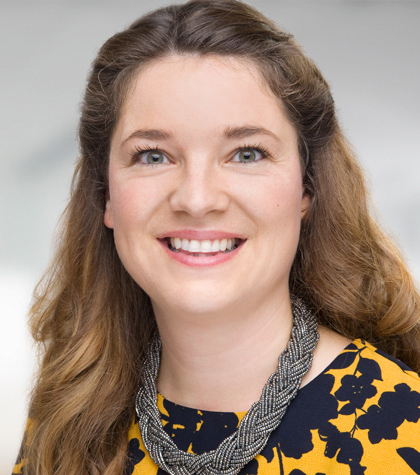
Project title: Gene Expression Dynamics of Testis Development during Human Puberty
Funding period: 01.03.2019 - 30.09.2020
"The 1.5 years of my HAL-OX programme I spent in the lab of Professor Anne Goriely. The group uses a human genetic approach that relies on the latest developments of Next Generation Sequencing technology to study the intimate relationship that exists between the occurrence of new mutations and the regulation of cell fate choices in the male germline. My research project thereby focused on the spatio-temporal gene expression of somatic testicular cells (called “niche”), to gain deeper insight into the events that lead to testicular reformation during puberty (Guo et al., 2020 Cell stem cell).
The lab is located in the Weatherall Institute of Molecular Medicine, an institute accommodating around 50 different scientific groups with major focus on research topics around haematology, oncology and immunology. The institute is technically well equipped, enabling a flexible and state-of the-art research structure. In weekly symposiums internal and external researchers present their latest findings and build powerful research networks. The cosy canteen invites to exchange with 500 scientists from all over the world or to relax over tea and coffee.
The HAL-OX programme supports not only scientific development, but also provides an extensive personal journey accompanied by unique impressions and countless joyful moments."
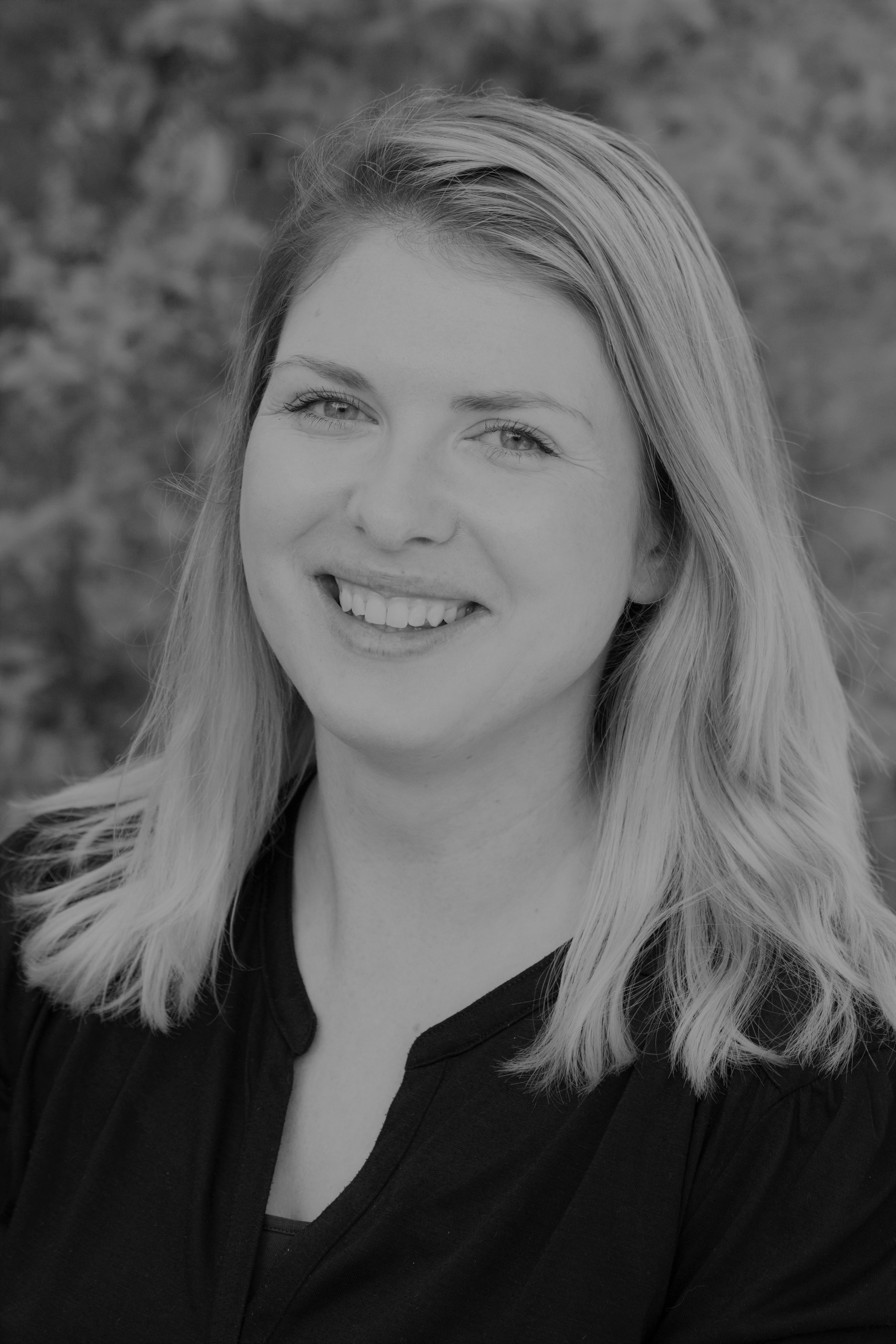
Project title: Inhibition of Carbonic Anhydrase IX with novel drugs in human breast cancer - natural pentacyclic sulfamate triterpenes
Funding period: 20.02.2019 - 29.02.2020
"Oxford stands for so much more than its impressive architecture, performance and prestige.
As part of my PhD, I had the privilege of conducting research in Professor Adrian L. Harris' lab at the Weatherall Institute of Molecular Medicine (WIMM). Due to the long-standing tumor hypoxia research of the group, I was able to include my own field of research from radiotherapy at the University Hospital Halle (UKH) and extend it with methods learned. I worked on potential betulinyl or maslinyl carboanhydrase inhibitors in human breast cancer cells. I received excellent support from an experienced postdoc. In collaboration with Professor Swietach from the Department of Physiology, Anatomy and Genetics I was allowed to perform the physiological part of my experiments and thus commuted between two institutes. Especially in the Weatherall Institute of Molecular Medicine, the "Core Facilities" offered the possibility of a quick and professional exchange about a research problem and to solve it effectively. I experienced a high level of intercultural fellowship in the institutes, which motivated me as well as taught me to approach new questions and perspectives in current tumor research. The daily input of scientific fields in the form of seminars at lunchtime influenced my scientific career. In the evening, the city offered social gatherings in a cozy atmosphere. All things considered, Oxford is a great overall package for professional and personal development."
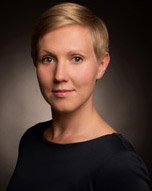
Project title: Investigating the role of the microenvironment in T21-mediated disruption of fetal hematopoiesis
Funding period: 09.01.2019 - 31.07.2019

Guest laboratory: Dr. Eva Kantelhardt, Medizinische Fakultät der Martin-Luther-Universität Halle-Wittenberg, Institut für Medizinische Epidemiologie, Biometrie und Informatik, Global Health
Project title: Breast cancer epidemiology in sub-Saharan Africa
Funding period: 23.04.2018 - 30.06.2018
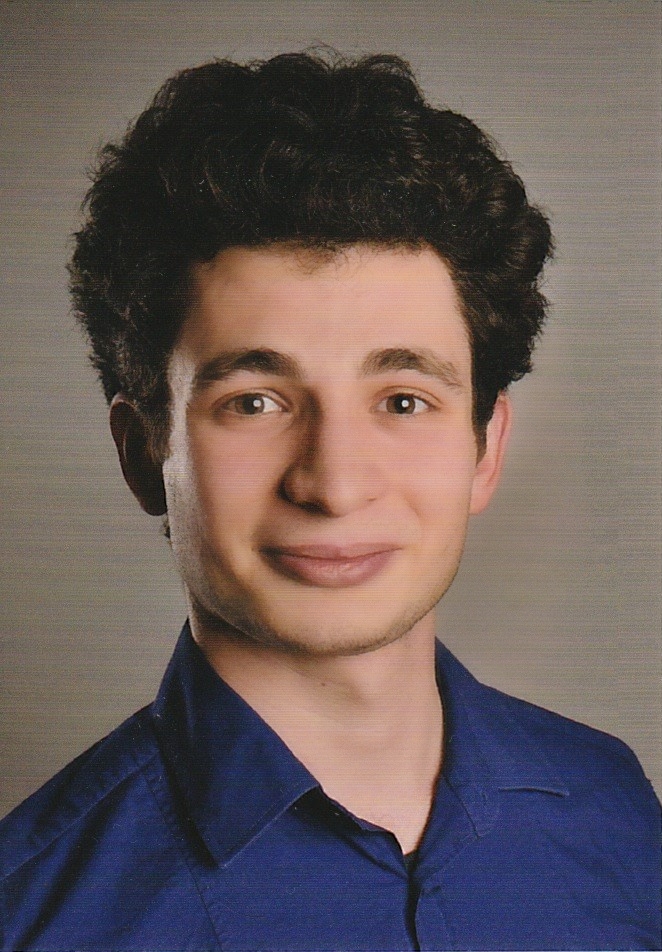
Project title: Investigation of the mechanisms of viral restriction by IFITM3
Funding periods: 16.04.2018 - 15.04.2019 and 01.03.2020 - 30.03.2020
"The perfect combination of ERASMUS and experimental doctoral thesis. Through the HAL-OX programme, I had the chance to conduct research for my PhD in an international team at one of the most renowned universities in the world. I was able to work independently on projects and benefit from incredible cooperation in the group and between groups in the institute. Between exciting research and exploring the country, my stay in Oxford passed far too quickly. Many thanks to Prof. Feller and Prof. Dong for enabling me to participate in the HAL-OX programme."

Project titles: Expansion Stimulated Emission Depletion Microscopy (ExSTED) of the peroxisomal translocon / STED nanoscopy of natural killer cells under the influence of hyperleptinemia and STED-nanoscopy of natural killer cells under the influence of hyperleptinemia
Funding period: 26.03.2018 - 26.12.2018
"As a PhD student of biochemistry, employed at the Martin-Luther-University Halle-Wittenberg Institute for Anatomy, the HAL-OX programme gave me the opportunity to work in the research group of Christian Eggeling at the Weatherall Institute of Molecular Medicine (WIMM). It was inspiring to experience the free and easy interdisciplinary collaboration between physicists and molecular biologists that is necessary to extract quantitiative information from cells. Seeing the depth of detail superresolution microscopy can show in a biological system was rather jaw-dropping. Some questions that followed from this project have led to a further cooperation between the Kielstein group and the Eggeling group.
For the chance, granted to me by the HAL-OX programme and the cordial welcome by the host group, to learn so much I am truly grateful: Seeing an idea mature from a wild sketch, jotted down during a tea break to a reliable dataset with adequate controls was quite something."
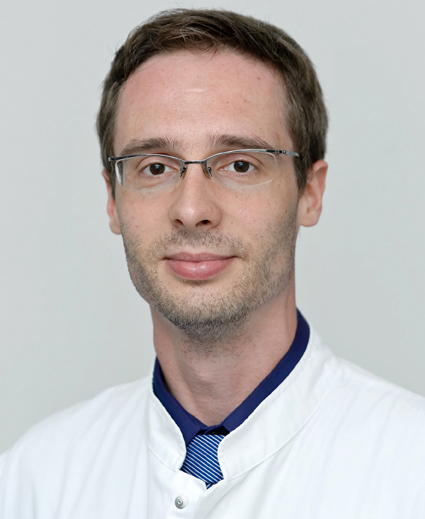
Project title: Tumor hypoxia / Tumor microenvironment
Funding period: 01.09.2017 - 28.02.2018
"I am a trained radiation oncologist and work at the Department of Radiation Oncology at the University Hospital Halle, where I am actively involved in translational research in radiation biology and clinical radiation oncology. I had the opportunity to spend six months in Professor Ester Hammond's lab at the Oxford Institute for Radiation Oncology. It was a great experience to work with an excellent international research team in an exceptional research environment, which was scientifically very stimulating and enriching. I am both grateful and proud to have been given the opportunity to participate in the HAL-OX programme, which provides young and aspiring graduates and researchers at the medical faculty of the Martin-Luther-University Halle-Wittenberg with an exceptional opportunity to conduct research at the world-renowned University of Oxford, UK."
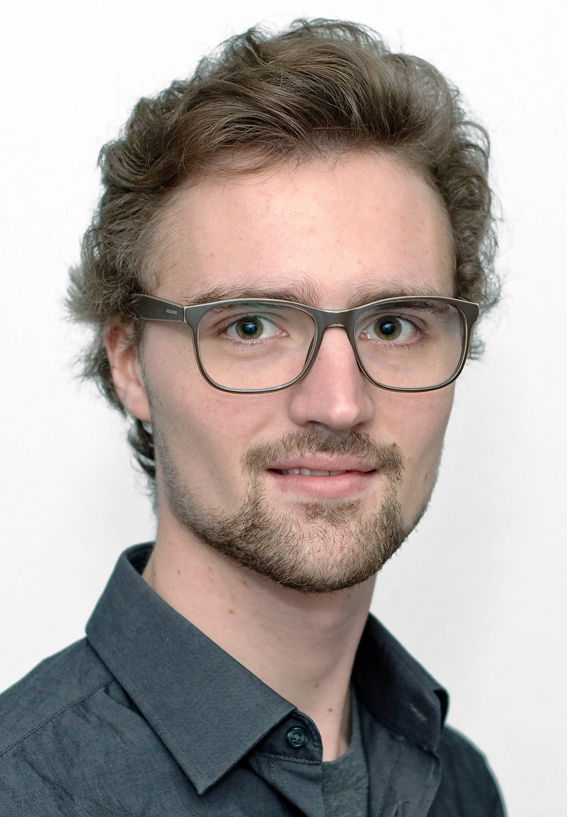
Project title: Studies of membrane changes in response to signal transduction using high/super-resolution microscopy
Funding period: 19.07.2017 - 19.10.2017

Project title: Functional characterization of the deubiquitinating enzyme OTUD3
Funding period: 01.07.2016 - 31.12.2016
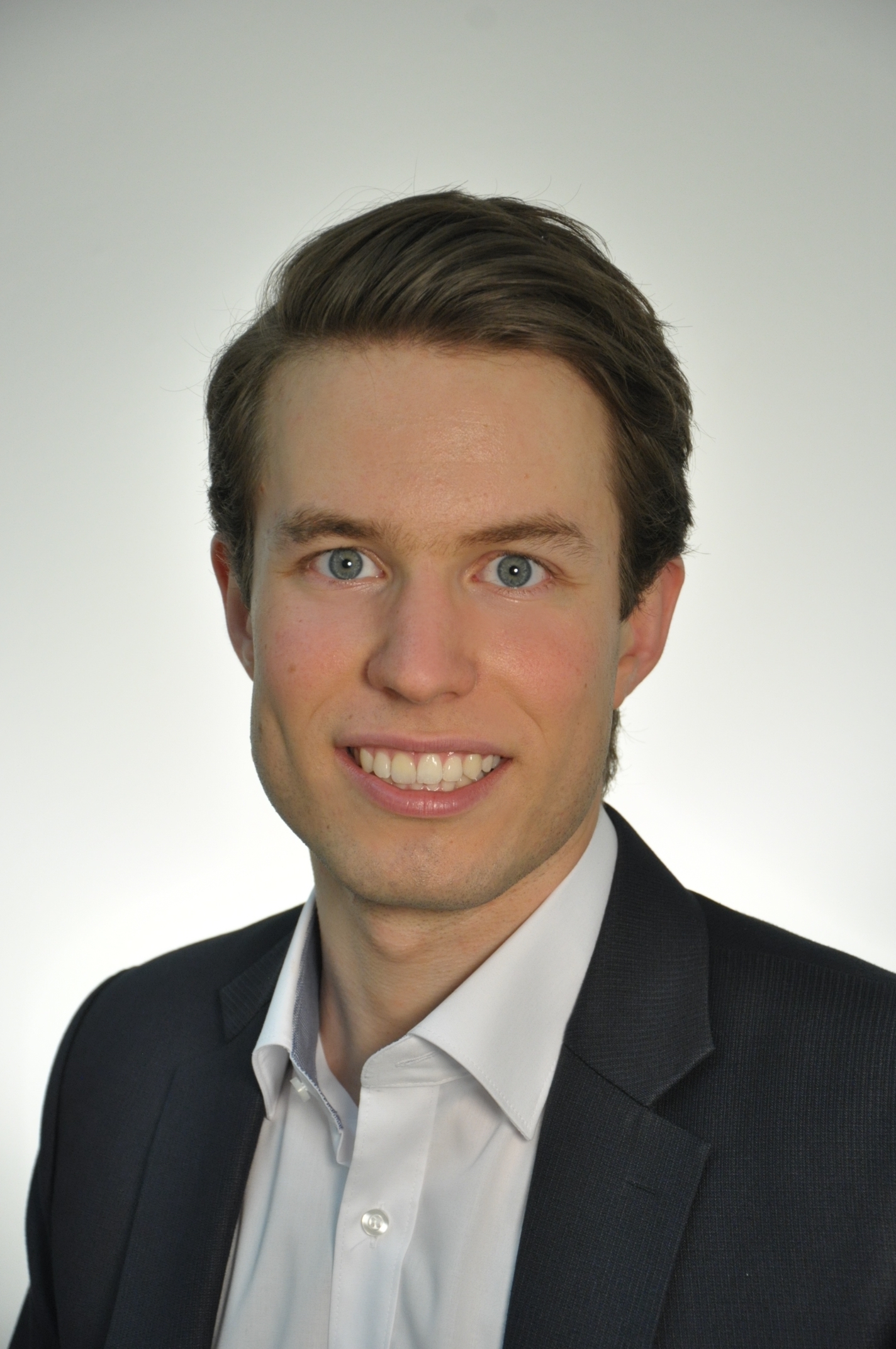
Project title: The role of insulin-like growth factor (IGF) signaling in tumor biology
Funding period: 01.04.2016 - 31.08.2016
„Through the initiative of Professor Feller of the Institute of Molecular Medicine at the Medical Faculty, Section Tumor Biology and by means of a scholarship, I was able to participate in a research internship of several months at the University of Oxford. I am very interested in basic research in the field of tumor biology because I focused on a similar topic in my doctoral thesis. I was therefore attracted by the Old Road Campus Research Building (ORCRB) in Oxford, which is part of the Department of Oncology."
Project title: Molecular analysis of cancer cell signaling
Funding period: 12.10.2015 - 01.04.2016
"The HAL-OX programme gave me the great opportunity to spend half a year at the renowned University of Oxford. In this half a year I made lots of great new experiences and had wonderful moments. Moreover, I met many great people from different countries and cultures. Oxford is a beautiful city and I still love to visit it."
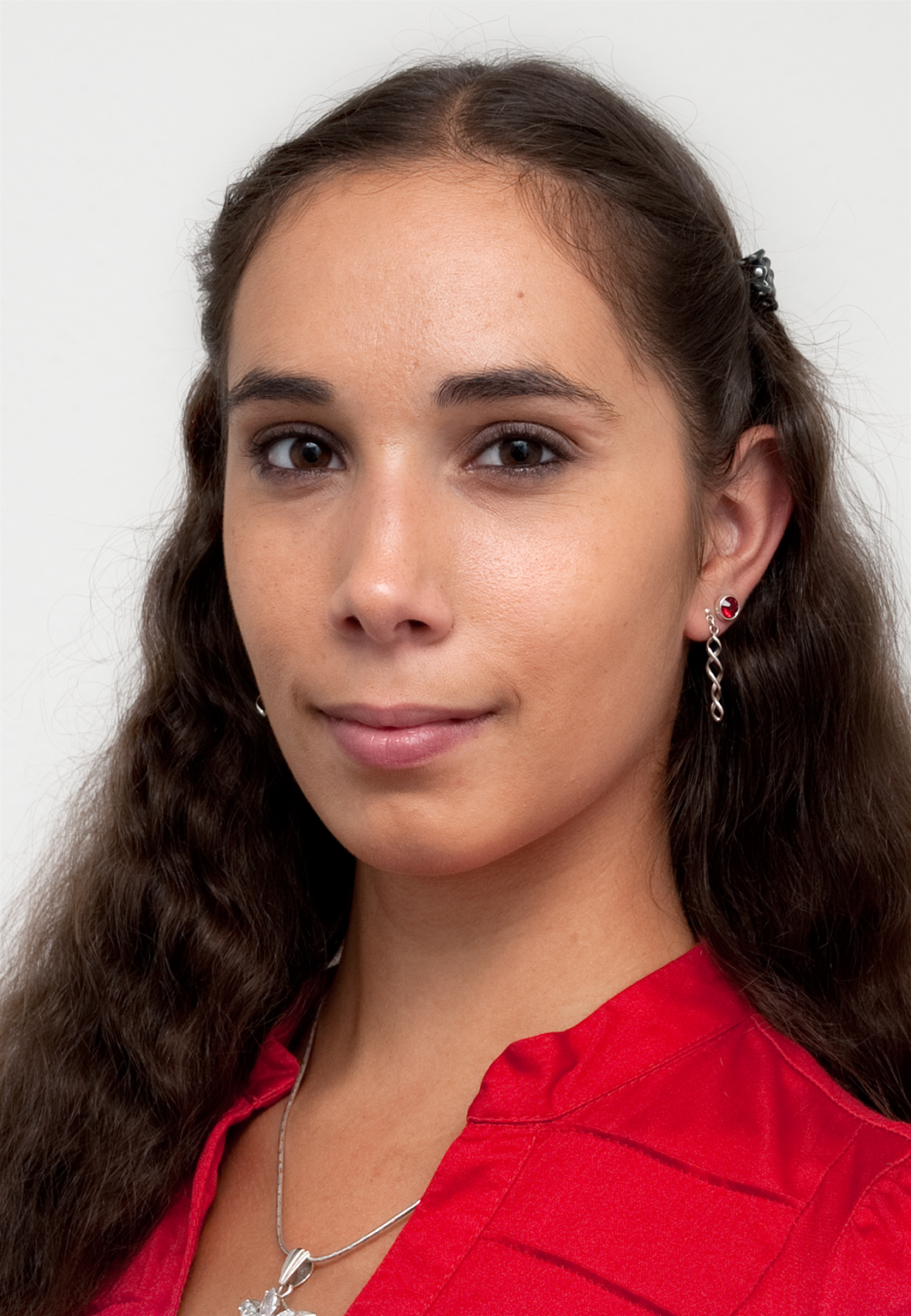
Project title: Panel for hemolytic anemias
Funding period: 04.07.2015 - 30.09.2015
„I am very grateful that Martin-Luther-University Halle-Wittenberg scholarship has given me the opportunity to gain new experience in the research field at such a renowned university, which will not only have a very positive impact on my curriculum vitae, but also improve my theoretical and practical skills."
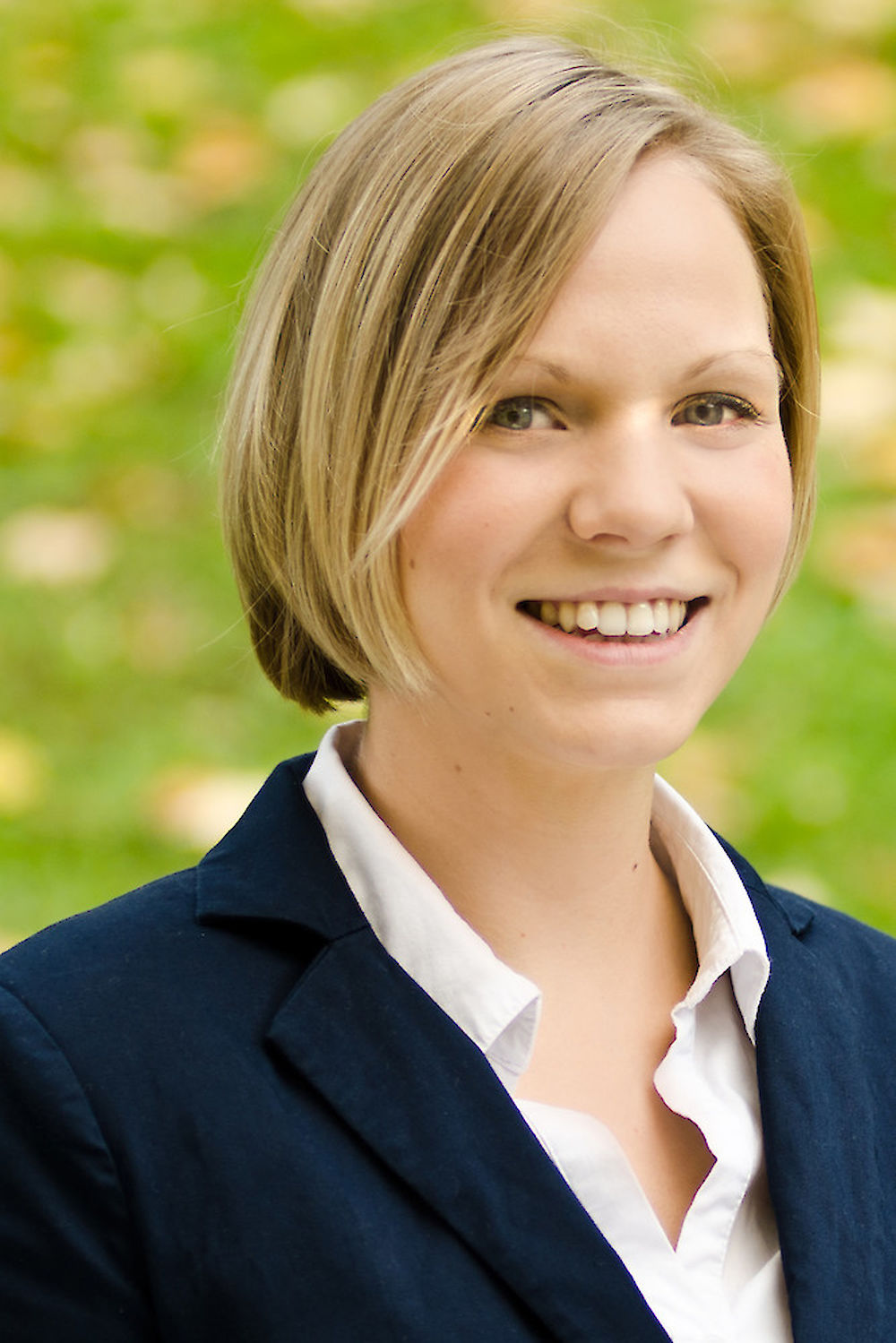
Project title: Functional and molecular analysis of the transcriptional and replication regulatory protein cyclin F
Funding period: 01.07.2015 - 30.09.2015
„I have always planned a research group internship abroad, on the one hand to improve my English skills, but also to get an insight into other laboratories. However, everyday laboratory life is no different than in Germany and the methods are also the same as those I learned in Halle.“
Applicants
The purpose of the EU (ESF)-funded HAL-OX research network is to foster international scientific research exchange and training at the highest quality level. To support this, we also fund research fellowships. For applications please contact the HAL-OX programme coordinator Prof. Stephan Feller.
Visa Requirements
UK visa requirements for EU citizens can be found on the UK government website. Non-EU citizens should visit the British Embassy website for specific details relevant for their country of origin.
Scholarship application
Scholarships are initially granted for a period of up to 12 months. An extension is possible in reasonable cases. Research projects of significantly less than 6 months will only be funded under special circumstances, e.g. in the context of existing collaborations. It is usually a good idea to begin the application process approximately 6 to 9 months before the anticipated start date. The initial application process usually takes about 4 to 6 weeks. It consists of a personal interview presenting general areas of interest, evaluating language skills, and providing comprehensive information about conducting research in Oxford. A key issue for a successful fellowship application is matching with a suitable host lab in Oxford. This can be done independently or with the help of the HAL-OX programme coordinator. So far, we have been able to arrange host laboratories for all qualified applicants. Details on how to select a host research team will be addressed during the personal interview.
Students of natural sciences will generally have earned a master's degree before beginning their HAL-OX funding, but well-justified exceptions are possible for students with bachelor's degrees. Medical students must have successfully completed their M1 exam ("Physikum") prior to the start of their grant. The full scholarship rate for students is currently €1,500 per month. Additional funding for on-site interviews at the Oxford host laboratories is also available, if needed.
PhD students and scientists (postdocs, senior scientists) with a contract at the Martin-Luther-University Halle-Wittenberg are not entitled to a full scholarship, but may instead receive a travel grant of €1,000 to cover their additional costs during their stay in Oxford. In certain cases, scientists traveling with children, for example, may receive additional reimbursement for the actual costs incurred.
In order to find a host laboratory at the Medical Faculty of the Martin-Luther-University Halle-Wittenberg in Halle (Saale), interested students and researchers from Oxford are asked to contact their existing cooperation partners or the coordinator of the HAL-OX programme Prof. Stephan Feller.
Downloads
- Stipend Application for MLU members for Conduct of Research in Oxford (to be submitted before the personal interview)
- Granting of a graduate scholarship for a stay abroad (€1,500 per month, form in german only)
- Granting of a travel scholarship for a stay abroad (€1,000€ per month, form in german only)
- Granting of a graduate scholarship for a MLU research stay (€1,500 per month, form in german only)
- Oxford Scientist Stipend Application for Conduct of Biomedical Research at the MLU

